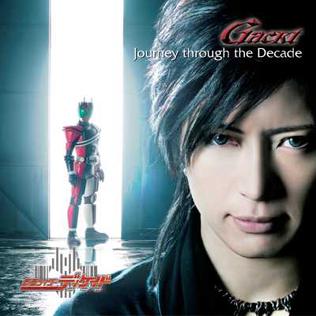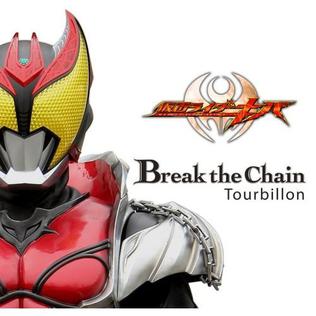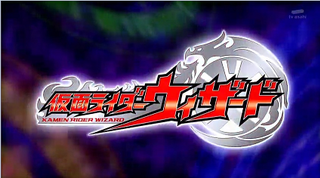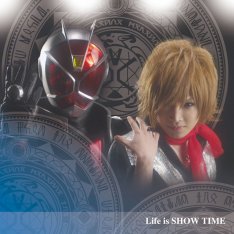
Anna Tsuchiya is a Japanese singer, actress and semi-retired model. Since 2005, she is primarily known as a singer.

"Anything Goes!" is a song by Japanese recording artist Maki Ohguro, her 32nd single in her over twenty-year-long career. The song serves as the opening theme of the 2010-2011 Kamen Rider Series Kamen Rider OOO. The single for the song was released on November 17, 2010, as a standard CD release and a CD+DVD release featuring the music video for the song. On September 15, 2010, Avex released the opening sequence edit of the song to digital music outlets. The single includes 3 variations of the song: the single cut, a ska edit, and the instrumental track. Japan-based rapper Rah-D is featured on the track. "Anything Goes!" is Maki Ohguro's first single in 11 years to break the top 10 of the Oricon at number 7, after selling 33,000 copies in its first week of release.

Kamen Rider Kiva is the 2008 Kamen Rider Japanese tokusatsu television series produced by Toei Company and Ishimori Productions. It is the series' ninth series in its Heisei era, and 18th series overall since the debut of Kamen Rider in 1971. It premiered on January 27, 2008, following the finale of Kamen Rider Den-O, and aired as a part of TV Asahi's 2008 Super Hero Time block with Engine Sentai Go-onger. The series was advertised to have horror film themes, such as Kamen Rider Kiva being a vampire. The first episode began with a commemoration of the series in honor of the seventieth anniversary of Shotaro Ishinomori's birthday.

"Journey Through the Decade" is a song by Japanese pop singer Gackt, serving as his thirtieth single released on March 25, 2009. It is his first song performed for Kamen Rider Decade, used as the television series' theme song.

Kamen Rider W, also called Kamen Rider Double, is a 2009–2010 Japanese tokusatsu drama, the eleventh series in the Heisei period run of the Kamen Rider Series and the twentieth overall. It premiered following the finale of Kamen Rider Decade on September 6, 2009, and aired alongside Samurai Sentai Shinkenger in TV Asahi's Super Hero Time programming block. Following Shinkenger's finale, it aired alongside Tensou Sentai Goseiger, until W concluded on August 29, 2010. The series is described as the "Heisei Kamen Rider 10th Anniversary Project: Fall Campaign". In the first episode of Kamen Rider Fourze, W is revealed to be in the same continuity as the original Showa timeline, making it the first series to do so since Kamen Rider Agito. The series is notable for being the first installment in what's popularly viewed as Heisei era Kamen Rider's second phase by fans. A sequel manga series, Fuuto PI, began serialization in August 2017 and an anime adaptation began airing in August 2022.

"Stay the Ride Alive" is the thirty-seventh single released by Japanese musical artist Gackt on January 1, 2010. The song was originally titled "Stay the Decade Alive", before being renamed "Stay the Ride Alive" in late November.
Kamen Rider Den-O is the seventeenth installment in the popular Kamen Rider Series of tokusatsu programs. As part of the series, several musical releases through Avex Mode were made for the series opening themes, ending themes, image songs, and original soundtracks. Most songs are rearrangements of the initial opening and ending themes.

Kamen Rider OOO is a 2010–2011 Japanese tokusatsu drama in Toei Company's Kamen Rider Series, being the twelfth series in the Heisei period run and the twenty-first overall. It began airing on September 5, 2010, the week following the conclusion of Kamen Rider W, joining Tensou Sentai Goseiger and then Kaizoku Sentai Gokaiger in the Super Hero Time lineup, until its conclusion on August 28, 2011. The series' titular Kamen Rider made a cameo appearance in the film Kamen Rider W Forever: A to Z/The Gaia Memories of Fate and a supporting character in other Kamen Rider movies.

Kamen Rider Fourze is a Japanese tokusatsu drama in Toei Company's Kamen Rider Series, being the thirteenth series in the Heisei period run and the twenty-second overall. It began airing on September 4, 2011, the week following the conclusion of Kamen Rider OOO, joining Kaizoku Sentai Gokaiger and then Tokumei Sentai Go-Busters in the Super Hero Time lineup.

Kamen Rider × Kamen Rider Fourze & OOO: Movie War Mega Max is a 2011 film in the Kamen Rider series that was directed by Koichi Sakamoto. It features the casts of Kamen Rider Fourze and Kamen Rider OOO, and opened in Japanese theaters on December 10, 2011.

"Break the Chain" is a song by Japanese rock band Tourbillon, and was the band's fifth and final single. It was released a year-and-a-half following the release of their second album A Tide of New Era, and was used as the opening theme for the 2008 television series Kamen Rider Kiva. Ryuichi Kawamura stated that the song was not just the "let's beat up the bad guys!" kind of Kamen Rider Series opening theme, but a song that both children and adults can enjoy.

Kamen Rider Fourze the Movie: Space, Here We Come! is the theatrical film for the 2011-2012 Kamen Rider franchise drama Kamen Rider Fourze. The film was released on August 4, 2012, alongside the Super Sentai franchise film Tokumei Sentai Go-Busters the Movie: Protect the Tokyo Enetower!. The film also features the debut of the titular character of Kamen Rider Wizard.

Kamen Rider Wizard is a Japanese tokusatsu drama in Toei Company's Kamen Rider franchise, being the fourteenth series in the Heisei period run and the twenty-third overall. It began airing on TV Asahi on September 2, 2012, joining Tokumei Sentai Go-Busters and then Zyuden Sentai Kyoryuger in the Super Hero Time lineup. Tsuyoshi Kida is the series' main screenwriter.

"Life Is Show Time" is the debut solo single of Golden Bomber vocalist Shō Kiryūin. It serves as the opening theme song to the 2012 Kamen Rider Series Kamen Rider Wizard. In recording the song, Kiryūin stated that he felt closer to being like his idol Gackt, who performed a previous Kamen Rider Series' theme song in 2009. The single had 4 editions released: a standard CD release, a standard DVD release containing the music video, and two additional limited edition DVD releases subtitled "Oni" and "Ikusa" which include edited versions of the music video.

"Love Wars" is a song by Queen & Elizabeth, fictional characters portrayed by AKB48 members Tomomi Itano and Tomomi Kasai, respectively, for the soundtrack of the 2009-2010 Kamen Rider Series Kamen Rider W.

Kamen Rider Gaim is a Japanese television series, a tokusatsu drama that is in the Kamen Rider Series; it is the 15th series during its Heisei run and 24th overall. The series, written by Gen Urobuchi, directed by Ryuta Tasaki and produced by Naomi Takebe, began airing on TV Asahi from October 6, 2013, replacing Kamen Rider Wizard in its initial timeslot and joining Zyuden Sentai Kyoryuger then Ressha Sentai ToQger in the Super Hero Time programming block, until Gaim concluded on September 28, 2014.

"Just Live More" is a song by Japanese reggae band Shōnan no Kaze under the name "Gaim no Kaze", released on December 11, 2013. It serves as the opening theme song for the children's television series Kamen Rider Gaim.

Kamen Rider Drive is a Japanese tokusatsu television series serving as the 16th Heisei Kamen Rider Series, and 25th series overall. Riku Sanjo returns to the Kamen Rider Series to serve as Drive's lead screenwriter, with Ryuta Tasaki as director. It premiered on TV Asahi and affiliate stations throughout Japan on October 5, 2014, the week following the finale of its preceding series Kamen Rider Gaim, and joining Ressha Sentai ToQger then Shuriken Sentai Ninninger in the Super Hero Time programming block, until Drive concluded on September 27, 2015. Drive is peculiar among the heroes in the Kamen Rider franchise, as his motif and main mode of transportation is a car, rather than the signature motorcycles used by his predecessors.
Toei Hero Next is a series of Japanese movies created and produced by Toei Company.

Kamen Rider Saber is a Japanese tokusatsu drama, the 31st entry of Toei Company's Kamen Rider franchise, and the second series to debut during the Reiwa period. The series premiered on September 6, 2020, joining Mashin Sentai Kiramager, and later, Kikai Sentai Zenkaiger in the Super Hero Time line-up after the finale of Kamen Rider Zero-One before being succeeded by Kamen Rider Revice on September 5, 2021. The series is notable for its use of a fantasy setting, along with its storybook theming.



















